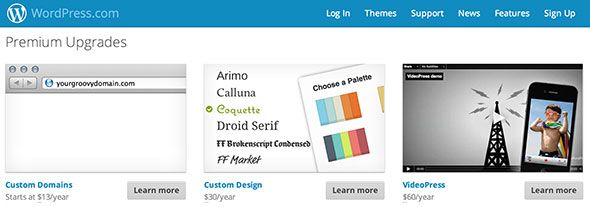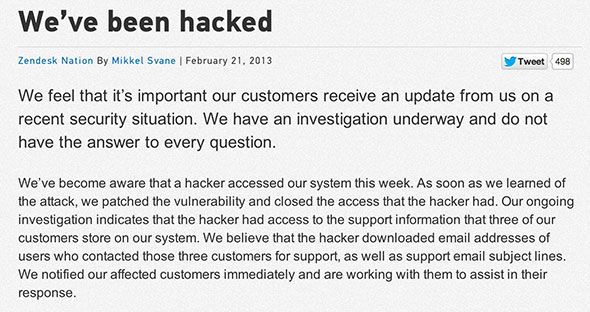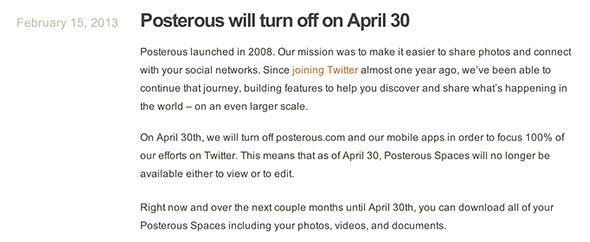Yesterday's article examined the pros and cons of setting up your own blog using a web host, domain name and software like WordPress. While this method takes some time, money and effort on your part it also provides a high level of control over your personal online outlet.
The alternative is to use a "sign-up" service like Blogger, Tumblr and WordPress.com which provides a quicker way to start writing rather than creating SQL databases and fiddling with plugins. While this method is more appealing for newcomers, there are some drawbacks and potential concerns and we'll be looking out for them here.
Hopefully you can then decide which service is right for you.
Choosing A Service
The hardest thing you'll have to do if you opt to not host your own blog is decide on the service you want to use. A few years ago this was easy - LiveJournal and Blogger dominated, providing a generation of teenagers with a place to moan about the wrongs in the world but these days there are more services to choose from than ever before, each with a niche.
WordPress.com might be the first port of call, largely because it's very similar to hosting your own WordPress install with a little less control over the end results. You get 3GB of free space, social integration and analytics as well as the ability to change themes and such. Premium features include themes, custom domains and the removal of adverts, each of which is billed yearly.
Tumblr is home to a mixed bag of content creators, with an emphasis on visual and rich media. That's not to say words don't belong on Tumblr, and there are some great themes with an emphasis on typography. Blogger, a Google product, is used by the company to release news about new and existing products which received a facelift a few years ago and continues to focus on being a primarily written-word platform. Last of all, there's a crossover platform in the form of social media.
Tumblr, Blogger and the big two "publishing" social platforms that are Facebook and Google+ are all infinitely more "social" than your self-hosted website. Tumblr has the ability to follow users, like Twitter. Blogger can use your Google account to keep track of updates and Facebook and Google+ are built on top of swelling user bases and a demand for shared content. Facebook has the subscribe button for individuals, or the Like button for pages and G+ is all about circling people you like. These are now viable options for publishing your thoughts, though the price is customization and an opportunity to appear unique. Put simply, everyone's Google+ and Facebook posts look the same.
Once you've come to a decision the hard part is over - next you've got to name, theme and get on with it. Theming such services is often restrictive, though Blogger, WordPress.com and Tumblr all have options for custom themes, with the latter two offering a range of premium themes as well. In addition to this, each service can be used with a custom domain, though WordPress.com will charge you for this.
These "sign-up" services will never ask you to maintain the workings of your blog - it will all be taken care of for you. This is in contrast to a self-hosted WordPress blog which requires constant maintenance to patch security holes in both the core engine and plugins.
Made Your Mind Up?
As a blogger looking to use one of these services you should be prepared for restrictions, particularly those designed to make the providers money. Small premium upgrades can add up to more than the price of a hosting plan and domain, so be wary of this. You're also bound in writing when it comes to submitting yourself to the service's terms of service and privacy agreements which can (and do) change at any time. Don't agree with something? Time to move your musings elsewhere - and what a hassle that can be.
While it's true that the maintenance of your blog using a service like this is not necessarily down to you, that's not to say you're safe. No website is safe from attack, and the implications of a service-wide attack can be just as damaging as an isolated attack on your personal webspace. Tumblr recently exemplified this when their support system, Zendesk, was compromised...though the support system is also used by Twitter and Pinterest.
The company admitted that: "subject lines of your emails to Tumblr Support may have included the address of your blog which could potentially allow your blog to be unwillingly associated with your email address" and "other information included in the subject lines of emails you’ve sent to Tumblr Support may be exposed". For some people this could be a devastating event, particularly if the whole point of the blog is to remain anonymous.
One Last Thing
Despite the restrictions, the chance that your blog will look virtually identical to someone else's and those small premium upgrades that add up to a lot of money, there is one far greater potential drawback to choosing to host your blog using such a service: the potential for closure. Who is to say that Google, who have recently closed iGoogle and Google Reader, won't just pull the plug on Blogger? For the moment that looks unlikely, because Google still uses Blogger but the point still stands for any of these services.
Posterous was a real alternative to Tumblr that had been running since 2008, providing tight typographic layouts and manageable mini-sites to professional, Twitter-types. Unfortunately for the many who still use the service it has been announced that on April 30 of this year the service will be switched off, a direct result of the service being acquired by Twitter. Thankfully the service has made it easy to export data, and there is even talk of a premium alternative. The fact remains that this could happen to the service you choose, and you should be aware before making a decision.
Pros to choosing an existing blog service:
- Fast and easy set up, the quickest way to get blogging.
- No maintenance on software.
- Themes, custom domains and other limited customizations.
- Social, community-driven services aided with sharing.
Cons to choosing an existing blog service:
- Restrictions on what you can do to your blog, some premium features.
- Must adhere to terms and conditions as well as privacy policies.
- Potential closure of the service.
- Security breaches can affect a whole network of users.
Whatever you choose remember that the real reason people will visit your blog is for the content. Without this, you don't even have a blog and take it from me, spending ages trying to work out which option is right for you only slows down the process of actually publishing some content. Make your choice, and stick to it - happy blogging!
What do you think - is it better to pick a self-hosted blog or sign up for a service? Have your say in the comments below and don't forget to read part 1 of this article.






